

Now I see it, now I don't researcher's position and reflexivity in qualitative rsearch. Keeping Journals as Qualitative Mindset. Becoming a Reflexive Researcher - Using Our Selves in Research - Kim Etherington - Google Books. Essentials of a Qualitative Doctorate - Immy Holloway, Lorraine Brown - Google Books. Reflexivity - the researcher's voice in qualitative research. This is a short paper that I worked on as part of my early PhD studies (2010).
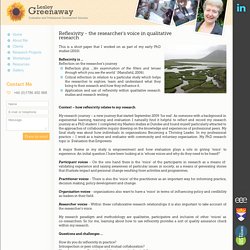
Reflexivity is … Reflection on the researcher’s journey Reflection plus …‘An examination of the filters and lenses through which you see the world.’ (Mansfield, 2006). Critical reflection in relation to a particular study which helps the researcher to explore, learn and understand what they bring to their research and how they influence it. Frontmatter - Reflexivity. Bringing my creative self to the fore: accounts of a reflexive re.
Know Thy Self - Socrates. Reflections from the Field: Questions to Stimulate Reflexivity Among Qualitative Researchers. Reflective practice. Reflex 2. Using reflexivity to enhance in-depth interviewing skills for the clinician researcher. Contrary to the assertion that research interviews are less complex, for the novice GP researcher conducting the presented research they presented significant challenges, particularly the move from a largely deductive to a more inductive approach.
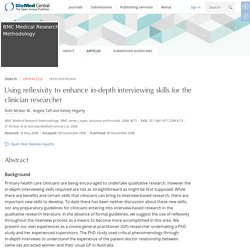
Method problems such as question sequences that were inflexible, and unsuitable questioning techniques [16] were unconsciously present in the early pilot interviews, and increasingly became evident to the GP researcher during interviews and transcribing. Many of the areas needing improvement that we will discuss will be familiar to any researcher, whether clinician or not, however we suggest they are areas that the novice clinician researcher needs to be particularly aware of. Reading pilot interview transcripts by the two supervisors highlighted these various pitfalls and allowed for a discussion of better and more open approaches.
Control of the interview Interviewer: Tell me about the range of patients you see. Interviewer: Quite a contrast. Abstract: Making Internal Conversations Public: Reflexivity of the Connected Doctoral Researcher and Its Transmission Beyond the Walls of the Academy (Third ISA Forum of Sociology (July 10-14, 2016)) A Reflexive Autoethnography of Doctoral Supervision. Working in Collaboration: Three PhD Students Trouble Reflexivity. Gemma A.
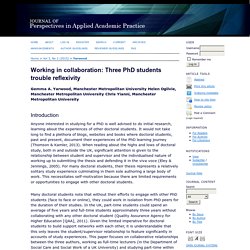
Yarwood, Manchester Metropolitan University Helen Ogilvie, Manchester Metropolitan University Chris Yianni, Manchester Metropolitan University Introduction Anyone interested in studying for a PhD is well advised to do initial research, learning about the experiences of other doctoral students. It would not take long to find a plethora of blogs, websites and books where doctoral students, past and present, document their experiences of the PhD learning journey (Thomson & Kamler, 2013). When reading about the highs and lows of doctoral study, both in and outside the UK, significant attention is given to the relationship between student and supervisor and the individualised nature of working up to submitting the thesis and defending it in the viva voce (Eley & Jennings, 2005). Many doctoral students note that without their efforts to engage with other PhD students (face to face or online), they could work in isolation from PhD peers for the duration of their studies.
Discussion. Writing up your phd qualitative research. Subjectivity and Reflexivity in Qualitative Research—The FQS Issues. Volume 4, No. 2, Art. 23 – May 2003 Subjectivity and Reflexivity in Qualitative Research—The FQS Issues Katja Mruck & Franz Breuer Abstract: By publishing two FQS issues on "Subjectivity and Reflexivity in Qualitative Research," we address a topic that is central for modern science.

On the one hand, there are many demands from philosophy of science and there are numerous methods that aim at eliminating researchers' impact on the research process except in controlled treatments. Assessing Reflexivity in Professional Doctorate Practice and Research G SIMON HEA Luton by Gail Simon on Prezi. Mauthner Doucet Reflexive Accounts. The Routledge Doctoral Student's Companion: Getting to Grips with Research ... - Google Books. Reflexivity in Qualitative Research: Reflections from a workshop. Helping Doctoral Students Write: Pedagogies for Supervision - Barbara Kamler, Pat Thomson - Google Books. Why you should care about reflexivity in prevention research. In today’s post, Angelina Brotherhood, doctoral researcher at the University of Vienna, invites us to reflect on ‘why’ we conduct our research and how our own values and beliefs influence our research.
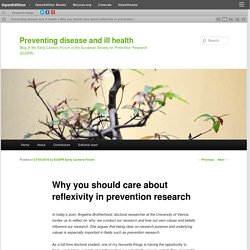
She argues that being clear on research purpose and underlying values is especially important in fields such as prevention research. As a full-time doctoral student, one of my favourite things is having the opportunity to think, read, listen, and talk about things that are not strictly project-related. Though I might receive my degree sooner if I focussed solely on ‘getting the job done’, I take the view that the doctorate is not just about completing a research project.
Ultimately the doctorate (and the early career phase generally) should be about determining what kind of professional you want to be, right? Sometimes it is worth going a bit slower but having time to breathe and look around (picture © Mike Brotherhood, used with permission) About the author. Taking the doctoral walk. This is a guest post from Susan Gollifer, a doctoral researcher in education at The University of Iceland.

Susan’s research looks at teachers and human rights curriculum. I am coming towards the end of a two-month Erasmus placement at a university overseas. During this time, I have had the opportunity to work with master’s level students on their academic writing and to write two chapters of my own thesis-I should add, draft chapters. As I approach the time to return home, I have started to reflect on my learning experience in terms of how productive I have been with my thesis writing. The Language/Action Model of Conversation: Can conversation perform acts of design? Written for Interactions magazine by Peter H.
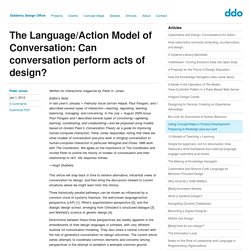
Jones. Editor’s Note:In last year’s January + February issue Usman Haque, Paul Pangaro, and I described several types of interaction—reacting, regulating, learning, balancing, managing, and conversing. In the July + August 2009 issue, Paul Pangaro and I described several types of conversing—agreeing, learning, coordinating, and collaborating—and we proposed using models based on Gordon Pask’s Conversation Theory as a guide for improving human-computer interaction. Peter Jones responded, noting that there are other models of conversation and prior work in bringing conversation to human-computer interaction in particular Winograd and Flores 1986 work with The Coordinator.
We agree on the importance of The Coordinator and invited Peter to outline the history of models of conversation and their relationship to HCI. —Hugh Dubberly A Conversation about Conversation What are the contexts for conversation?